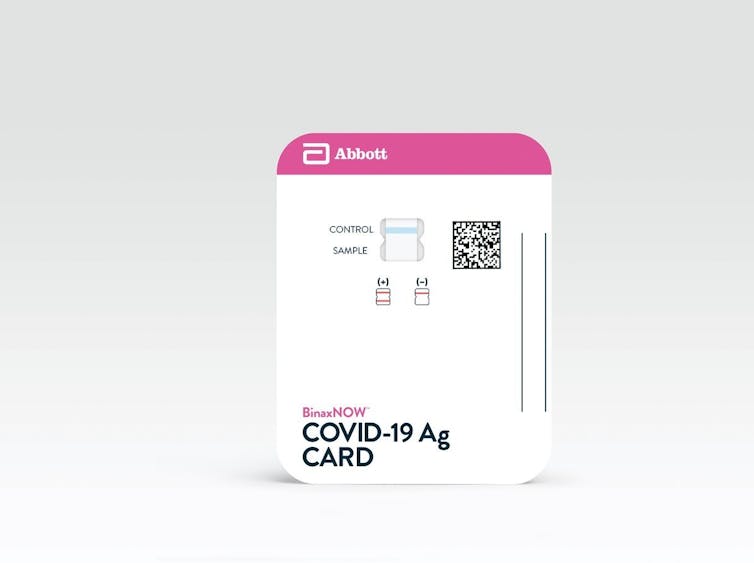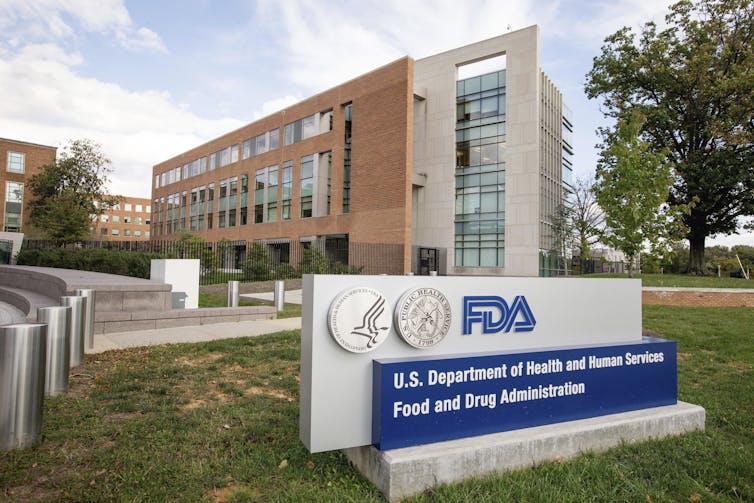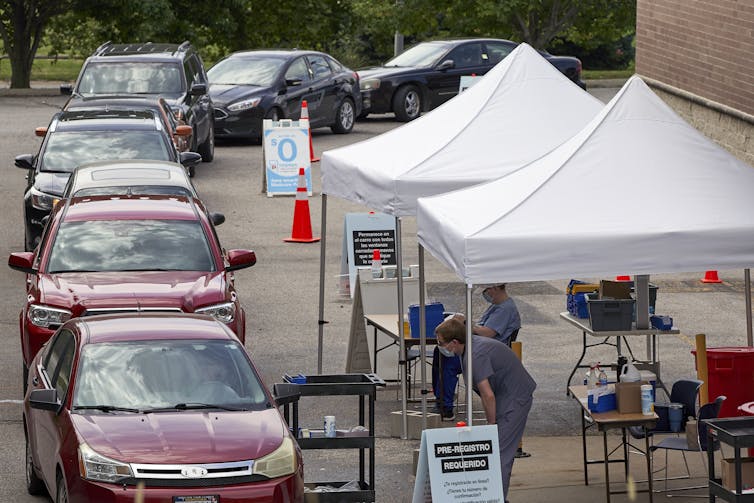Will the new 15-minute COVID-19 test solve US testing problems?
- Written by Zoë McLaren, Associate Professor of Public Policy, University of Maryland, Baltimore County
On Aug. 26, the Food and Drug Administration[1] granted an Emergency Use Authorization[2] to a new rapid antigen test[3] for COVID-19 called the BinaxNOW test[4].
I study public health policy[5] to combat infectious disease epidemics. Testing is one of the most powerful tools available to fight the spread of COVID-19. The new test is inexpensive, rapid and easy to use[6]. It will massively scale up[7] access to testing, but hurdles remain in achieving widespread, frequent COVID-19 testing.
 The Abbott BinaxNOW rapid antigen test claims to give results in 15 minutes.
Abbott[8]
The Abbott BinaxNOW rapid antigen test claims to give results in 15 minutes.
Abbott[8]
What type of test is BinaxNOW?
The credit-card-sized test is an antigen test that detects a specific viral protein[9] from SARS-CoV-2. It costs US$5[10] and doesn’t require a lab or a machine for processing.
Performing the test is simple. A health care worker or technician would use a swab to collect a sample from less than 1 inch inside the nostril[11]. They would then combine the sample with a few drops of chemicals[12] inside the test card. Within 15 minutes, the test strip would show a positive or negative result. The test is also paired with an app[13] that produces a digital code that can be scanned to show proof of a recent negative COVID-19 test.
 The FDA granted emergency use authorization for the test, but only for use on patients with symptoms of COVID-19.
AP Photo/Andrew Harnik, File[14]
The FDA granted emergency use authorization for the test, but only for use on patients with symptoms of COVID-19.
AP Photo/Andrew Harnik, File[14]
What does the Emergency Use Authorization allow for?
The BinaxNOW test is currently only authorized for patients who have had COVID-19 symptoms for seven days or less[15], which is when virus levels in the body are likely to be high[16]. It must be prescribed by a physician and performed by a trained technician[17] or other health care worker.
The PCR test for COVID-19 is currently widely used and considered the gold standard[18], but requires patient samples to be sent to a lab and can take days to provide results[19]. The new antigen test is designed to be a cheap and quick alternative to PCR testing[20] for diagnostic purposes in a medical setting. It would add critical capacity to an overstretched testing system[21].
The emergency use authorization provides preliminary authorization[22] for doctors to prescribe the antigen test while the full FDA approval process is ongoing. The authorization could be revoked[23] if the test is not as accurate or reliable as expected.
[Get the best of The Conversation, every weekend. Sign up for our weekly newsletter[24].]
How accurate is this test?
Abbott, the health technology company[25] that produces the test, reports that when patients had symptoms the test was in agreement with PCR testing for 97.1% for COVID-19 positive cases and 98.5% for COVID-19 negative cases[26]. This is high enough for diagnostic settings[27] where accuracy is critical.
However, the true accuracy could be lower because the performance testing group was only 102 people[28] and the accuracy hasn’t been validated by the FDA as part of the full approval process. There will inevitably be some false negatives and false positives with the BinaxNOW test since accuracy isn’t 100%, but the FDA will monitor the data[29] to make sure the test meets the reported accuracy.
 Long lines and slow turnaround times have limited access to testing, but the new Abbott test should be far easier and faster.
AP Photo/Nati Harnik[30]
Long lines and slow turnaround times have limited access to testing, but the new Abbott test should be far easier and faster.
AP Photo/Nati Harnik[30]
Can this test be used for widespread screening?
The BinaxNOW test is cheap, rapid, able to be mass-produced and easy to use outside a lab. This makes it a promising candidate for widespread screening[31]. However, the test is currently only authorized for people with COVID-19 symptoms.
This is an obstacle because an estimated 40% of all COVID-19 cases are asymptomatic[32] and these people likely don’t know that they’re contagious. To maximize the effectiveness of any COVID-19 screening program, it is important to test people whether they have symptoms or not.
Health care providers are able to prescribe the BinaxNOW test for asymptomatic patients for off-label use[33], but health officials don’t yet know how accurate the test is[34] when performed on asymptomatic people.
Is this test a game-changer?
The massive expansion of testing access made possible by the BinaxNOW test will almost surely outweigh the downsides of a small number of inaccurate results. Abbott plans to manufacture 50 million tests per month[35] starting in October. This will quickly exceed the 76 million COVID-19 tests[36] the U.S. has performed over the last six months.
Widespread, frequent testing is effective at slowing the spread[37] of the coronavirus. The new testing capacity made possible by the authorization of this rapid antigen test represents a major advance in bringing the pandemic under control.
References
- ^ Food and Drug Administration (www.fda.gov)
- ^ Emergency Use Authorization (www.fda.gov)
- ^ antigen test (theconversation.com)
- ^ BinaxNOW test (abbott.mediaroom.com)
- ^ study public health policy (scholar.google.com)
- ^ inexpensive, rapid and easy to use (abbott.mediaroom.com)
- ^ massively scale up (abbott.mediaroom.com)
- ^ Abbott (abbott.mediaroom.com)
- ^ specific viral protein (blogs.sciencemag.org)
- ^ costs US$5 (abbott.mediaroom.com)
- ^ less than 1 inch inside the nostril (www.fda.gov)
- ^ few drops of chemicals (www.fda.gov)
- ^ test is also paired with an app (www.abbott.com)
- ^ AP Photo/Andrew Harnik, File (www.apimages.com)
- ^ COVID-19 symptoms for seven days or less (abbott.mediaroom.com)
- ^ likely to be high (doi.org)
- ^ prescribed by a physician and performed by a trained technician (abbott.mediaroom.com)
- ^ considered the gold standard (theconversation.com)
- ^ take days to provide results (theconversation.com)
- ^ cheap and quick alternative to PCR testing (www.sciencemag.org)
- ^ overstretched testing system (theconversation.com)
- ^ preliminary authorization (www.fda.gov)
- ^ revoked (www.fda.gov)
- ^ Sign up for our weekly newsletter (theconversation.com)
- ^ Abbott, the health technology company (www.abbott.com)
- ^ 97.1% for COVID-19 positive cases and 98.5% for COVID-19 negative cases (abbott.mediaroom.com)
- ^ high enough for diagnostic settings (www.hcplive.com)
- ^ performance testing group was only 102 people (www.fda.gov)
- ^ FDA will monitor the data (www.fda.gov)
- ^ AP Photo/Nati Harnik (www.apimages.com)
- ^ widespread screening (theconversation.com)
- ^ 40% of all COVID-19 cases are asymptomatic (theconversation.com)
- ^ off-label use (www.fda.gov)
- ^ don’t yet know how accurate the test is (www.cnbc.com)
- ^ 50 million tests per month (abbott.mediaroom.com)
- ^ 76 million COVID-19 tests (covidtracking.com)
- ^ effective at slowing the spread (doi.org)
Authors: Zoë McLaren, Associate Professor of Public Policy, University of Maryland, Baltimore County
Read more https://theconversation.com/will-the-new-15-minute-covid-19-test-solve-us-testing-problems-145285

